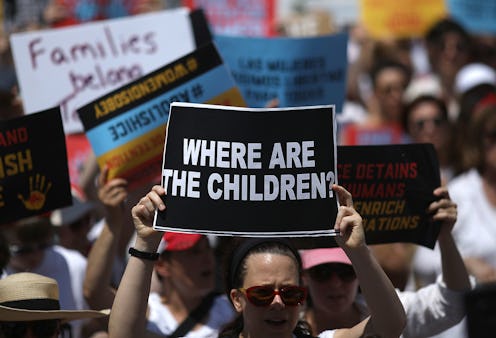News
There's A National Hotline Just To Help Reunite Immigrant Families — And You Can Pitch In

You'd think the Trump administration would have a service dedicated to reuniting the 2,000-plus immigrant families it has split up at the border, but it doesn't. Thankfully, a nonprofit is stepping in to fill the void: The advocacy group RAICES has started a hotline to reunite immigrant families who've been separated under the Trump administration's "zero-tolerance" immigration policy, which was announced in May and has since been rolled back.
On Thursday, RAICES launched the National Families Together Hotline. The number is 866-378-2667 (866-ESTAMOS); it's being staffed by volunteers from 9:00 a.m. to 5:00 p.m. CT, but families can leave a voicemail 24 hours a day. RAICES says it has already trained 120 volunteers to work the phones, and is accepting new volunteers through an application process here.
"Volunteers have been trained to gather the information necessary to reunite families, including searching for a parent with all known variations of their names and other indicators," RAICES explains on its website. "Once a parent is located, the volunteer will confirm the parent is being detained there with the relevant detention center. RAICES staff will return phone calls with locations to determine next steps, including referral to pro bono legal services, and support with release from detention and reunification."
Operating alongside the hotline is an online portal, also established by RAICES, that legal advocates can use to help share information about parents who've been separated from their children. According to RAICES, the portal has already identified 453 children who were separated from their parents since launching earlier in the week — and that was before the hotline went live.
“Our focus is on the parents who do not have access to counsel,” Jenny Hixon, director of development for RAICES, told the San Antonio Express-News. "A large part of getting these families released is getting them a bond and paying that bond...Immigrant bonds are at least $1,500 and can be up to $10,000 (or) $30,000, and that’s a huge hurdle for families."
Over 2,000 undocumented children were separated from their parents between June 4 and May 9 as a result of the Trump administration's family separation policy, or an average of 65 separations per day. Images of children in cages at detention facilities across the country prompted widespread outrage, and after several days of immense pressure, President Trump signed an executive order that ostensibly ends the policy.
The ACLU sued the administration over the policy, and on Tuesday, a federal judge granted a preliminary injunction blocking the administration from separating any more families. She also established a deadline for reunifying those that have already been separated: All children under age 5 must be reunited within 14 days, per the order, while the administration has 30 days to reunite older children with their families.
In addition to launching the National Families Together hotline, RAICES has been raising money to provide legal aid for the detained families. According to the Texas Tribune, a Facebook fundraising page for RAICES pulled in over $20 million in just a week and a half — three times the nonprofit's annual budget. RAICES has also raised over $5 million through its website, which briefly crashed under the traffic, the Tribune reports.
Celebrities and other public figures have raised or donated money to RAICES as well. After Trump insulted The Tonight Show host Jimmy Fallon on Twitter, Fallon responded by making a donation to RAICES. The writers' rooms of several popular TV shows also pledged support for the nonprofit, including Star Trek: Discovery, Brooklyn Nine-Nine, Ducktails and iZombie. Some have described the outpouring of support for RAICES and other civil rights organizations under the Trump presidency as "rage-giving," as many people who donate do so in response to the anger they feel at national political developments.
"I find sadness debilitating. It doesn't help anyone. But giving really does. It takes away that powerlessness," author Dahlia Adler Fisch told USA TODAY. “All I know is that every time I get mad, I do it again.”